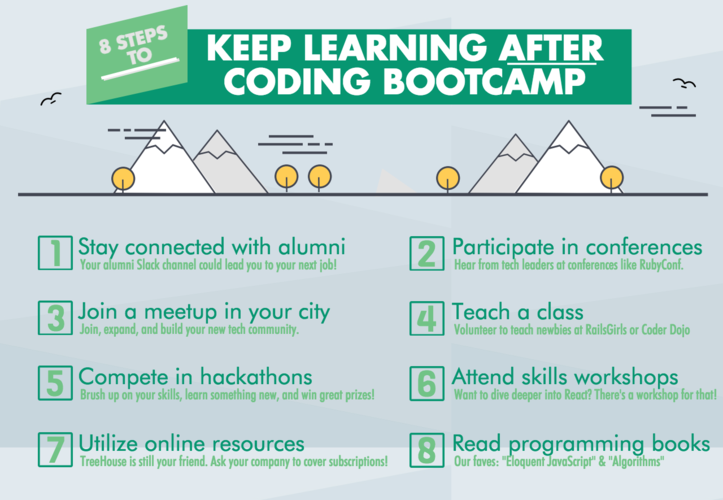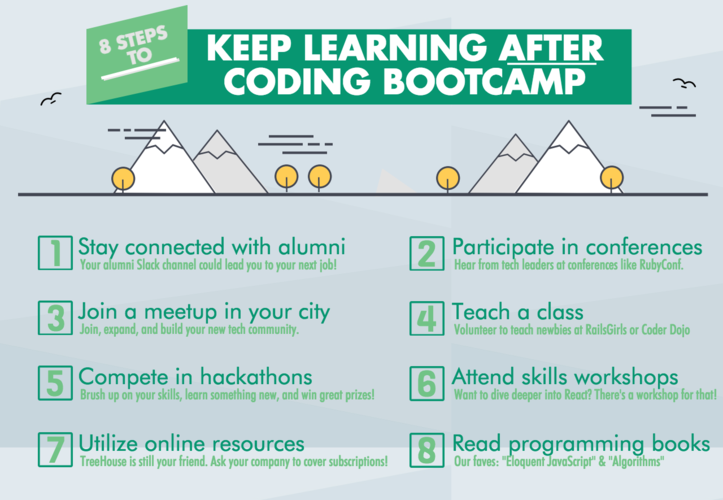Portfolio Development: What To Do After Coding Bootcamp

Building a compelling portfolio is crucial for showcasing your newly acquired coding skills and landing your dream job after bootcamp. A well-structured portfolio acts as a visual resume, demonstrating your abilities and project experience to potential employers. It’s not just about listing projects; it’s about telling a story of your growth and expertise.
What to do after coding bootcamp – Developing a strong portfolio requires a strategic approach, encompassing planning, design, and consistent project enhancement. This involves careful selection of projects, meticulous documentation, and a clear presentation of your capabilities. Remember, your portfolio is your first impression – make it count.
Portfolio Planning
A well-defined plan is the foundation of a successful portfolio. Begin by identifying your strongest skills and the types of projects that best demonstrate them. Consider the technologies you’re most proficient in (e.g., React, Node.js, Python, SQL) and aim to showcase projects that highlight these strengths. For example, if you’re strong in front-end development, include projects showcasing responsive design and user experience. If you’re proficient in back-end development, showcase projects demonstrating robust APIs and database interactions. Next, create a timeline for project development, considering the time needed for each project, including design, coding, testing, and deployment. Finally, establish clear goals for your portfolio – what do you want potential employers to see and understand after reviewing it?
Portfolio Website Mockups
Before diving into coding your portfolio website, create detailed mockups using pen and paper or a digital design tool. These mockups will serve as blueprints, guiding the structure and design of your website. Consider the overall layout, navigation, and visual elements. Think about how you want to present your projects – perhaps with thumbnails, brief descriptions, and links to live demos or GitHub repositories. These mockups should incorporate HTML, CSS, and JavaScript elements to visualize the interactive aspects of your portfolio. For example, a mockup might include a responsive navigation bar designed with CSS and JavaScript for smooth transitions, and a visually appealing project showcase using HTML and CSS for styling.
Showcase Projects
The heart of your portfolio lies in the projects themselves. Select projects that demonstrate a range of skills and complexities. Include projects that showcase front-end development (e.g., a responsive website with interactive elements), back-end development (e.g., a RESTful API for a to-do list application), and database integration (e.g., a project using a database to store and retrieve data). Consider including a project that involves a challenge you overcame, demonstrating your problem-solving abilities. For instance, a project that involved optimizing database queries to improve performance would showcase your analytical and problem-solving skills.
Project Descriptions and Code Comments
Clear and concise project descriptions are essential. For each project, provide a brief overview, explaining the purpose, technologies used, and key features. Highlight the challenges you faced and how you overcame them. Well-commented code is equally important. It not only makes your code easier to understand but also demonstrates your professionalism and attention to detail. Use comments to explain complex logic, algorithms, and design choices. Think of comments as annotations for your code, guiding others through your thought process.
Project Organization
Organize your projects logically, perhaps by category (e.g., web applications, mobile apps, data science projects) or by difficulty level (e.g., beginner, intermediate, advanced). This makes it easy for viewers to navigate and understand the scope of your work. Consider using a filtering system on your portfolio website to allow visitors to easily browse projects based on technology or category. This enhances the user experience and allows viewers to quickly find projects relevant to their interests.
Networking and Building Connections
Successfully launching your development career after a coding bootcamp requires more than just technical skills; it demands a robust professional network. Building connections with industry professionals opens doors to opportunities you might otherwise miss, providing invaluable insights and support as you navigate your career path. This section Artikels strategies for effectively networking and leveraging those connections for long-term success.
A strategic approach to networking significantly increases your chances of finding employment and building a thriving career. This involves proactively engaging with the tech community through various channels, both online and offline. Building a strong network is an ongoing process, requiring consistent effort and genuine engagement.
Developing a Networking Strategy
A comprehensive networking strategy combines online and offline activities. Attending industry events, such as tech conferences and meetups, provides invaluable face-to-face interaction. Simultaneously, leveraging platforms like LinkedIn allows for broader outreach and connection building. A balanced approach, utilizing both, maximizes your reach and impact. Regularly updating your LinkedIn profile with recent projects and accomplishments is crucial for attracting recruiters and potential employers. Furthermore, actively searching for and engaging with relevant industry groups and discussions on LinkedIn demonstrates your commitment and keeps you informed about industry trends.
Sample LinkedIn Messages for Informational Interviews
Reaching out to developers on LinkedIn for informational interviews is a powerful way to learn about different roles, companies, and career paths. Here are some examples of effective messages:
Example 1 (focused on a specific project): “Hi [Developer Name], I’m [Your Name], a recent coding bootcamp graduate with a strong interest in [Area of Specialization]. I was particularly impressed by your work on [Project Name] and would appreciate the opportunity to learn more about your experience at [Company Name]. Would you be open to a brief informational interview sometime next week?”
Example 2 (general inquiry): “Hi [Developer Name], I’m [Your Name], a recent graduate of [Bootcamp Name] specializing in [Area of Specialization]. I’m actively seeking opportunities in [Industry/Role] and admire your career trajectory at [Company Name]. I’d be grateful for the chance to ask a few questions about your experience. Are you available for a short call sometime in the coming weeks?”
Remember to personalize each message, highlighting what specifically interests you about the individual’s experience or work. Keep it concise, professional, and respectful of their time.
Benefits of Attending Tech Meetups and Conferences
Tech meetups and conferences offer numerous benefits beyond networking. These events provide opportunities for professional development through workshops and talks, allowing you to stay current with the latest technologies and industry trends. They also offer a chance to learn from experienced professionals, gain insights into different company cultures, and potentially discover hidden job opportunities. The informal setting of many meetups facilitates more relaxed conversations and relationship building. Conferences, while often larger and more formal, provide exposure to a wider range of companies and individuals.
Building Relationships with Instructors and Fellow Bootcamp Graduates
Your instructors possess valuable industry knowledge and connections, while your fellow bootcamp graduates share a similar experience and can offer support and collaboration. Maintaining these relationships post-bootcamp can lead to mentorship opportunities, potential job referrals, and future collaborative projects. Consider staying connected through shared online groups or informal gatherings.
Comparing Networking Platforms
While LinkedIn remains the dominant platform for professional networking in the tech industry, other platforms like Twitter and GitHub offer unique advantages. LinkedIn excels at connecting with professionals for informational interviews and job searching. Twitter facilitates engagement with industry thought leaders and staying abreast of current events. GitHub showcases your coding skills and allows you to connect with other developers based on shared projects and interests. The most effective approach involves strategically using a combination of these platforms to maximize your reach and build a comprehensive network.
Skill Enhancement and Continued Learning

Successfully completing a coding bootcamp is a significant achievement, but it’s only the beginning of your journey as a developer. The tech landscape is constantly evolving, demanding continuous learning and adaptation to remain competitive and relevant. This section Artikels strategies for enhancing your skills and staying ahead of the curve.
The post-bootcamp phase requires a proactive approach to skill development. Identifying areas needing improvement, creating a structured learning plan, and actively engaging with the developer community are crucial for long-term success. This involves understanding current market demands, choosing appropriate learning resources, and consistently updating your knowledge.
Identifying Areas for Skill Improvement
Analyzing current job postings for your target roles reveals in-demand skills. For example, a focus on specific frameworks like React or Angular, proficiency in cloud platforms like AWS or Azure, or expertise in databases like PostgreSQL or MongoDB are often highlighted. By comparing your current skillset with these requirements, you can pinpoint areas needing attention. Regularly reviewing job descriptions on sites like LinkedIn, Indeed, and specialized tech job boards provides valuable insights into market trends and expectations.
Creating a Plan for Continued Learning
A structured learning plan ensures consistent progress. This could involve dedicating specific time each week to learning new technologies or refining existing skills. Consider a combination of online courses (Udemy, Coursera, edX offer a wide range of developer courses), workshops (both online and in-person), and personal projects to reinforce your learning. For instance, a plan might include completing a React course on Udemy in two months, followed by building a personal portfolio website using React, and then attending a workshop on advanced React concepts.
Benefits of Contributing to Open-Source Projects
Contributing to open-source projects offers invaluable experience. It allows you to work on real-world projects, collaborate with experienced developers, learn from their code, and build your portfolio. Participating in open-source projects demonstrates your commitment to the developer community and enhances your problem-solving skills. For example, contributing to a popular open-source library on GitHub not only adds to your portfolio but also exposes you to different coding styles and collaborative workflows.
Staying Up-to-Date with Latest Technologies and Trends
The tech world moves rapidly. Staying current requires consistent effort. Following industry blogs, podcasts, and newsletters (like those from InfoQ or Hacker Noon) provides insights into emerging technologies and best practices. Attending tech conferences (both online and in-person) offers opportunities to network with other developers and learn from experts. Actively engaging in online developer communities (like Stack Overflow or Reddit’s r/programming) allows you to learn from others’ experiences and stay abreast of the latest discussions and solutions.
Comparing Online Learning Platforms
Various online platforms cater to developers. Udemy offers a wide range of courses at varying price points, often with practical projects. Coursera and edX feature university-level courses, often more theoretical but providing a strong foundation. Codecademy provides interactive learning experiences, ideal for beginners. Each platform has its strengths and weaknesses, and choosing the right one depends on your learning style, budget, and specific learning goals. For example, Udemy might be suitable for learning a specific framework, while Coursera could be better for gaining a deeper understanding of computer science fundamentals.
Financial Planning and Budgeting
Successfully navigating the post-bootcamp job search requires a solid financial plan. This involves careful budgeting to cover living expenses, manage debt, and account for the costs associated with finding employment. Failing to plan financially can add unnecessary stress during an already challenging transition.
Budgeting for Living Expenses, Loan Repayments, and Job Search Costs
Creating a realistic budget is crucial. This should include all essential expenses such as rent or mortgage payments, utilities (electricity, water, internet), groceries, transportation, and personal care items. Factor in loan repayments for student loans or bootcamp financing. Remember to allocate funds specifically for job search activities, including printing resumes, purchasing professional attire, and paying for online job boards or networking events. A useful budgeting tool is the 50/30/20 rule: allocate 50% of your income to needs, 30% to wants, and 20% to savings and debt repayment. Adjust these percentages based on your individual circumstances. For example, if you have significant student loan debt, you might allocate a larger percentage to debt repayment.
Strategies for Managing Finances During the Job Search
The job search process can be unpredictable, with periods of high activity followed by periods of relative inactivity. To manage finances effectively during this time, it’s important to build an emergency fund. Aim for 3-6 months’ worth of living expenses in a readily accessible savings account. This provides a safety net if your job search extends longer than anticipated. Consider tracking your spending meticulously using budgeting apps or spreadsheets. Explore opportunities for supplemental income, such as freelance work or part-time jobs, to bridge any financial gaps. Communicate openly with lenders about your job search status if you are facing difficulties with loan repayments. Many lenders are willing to work with individuals facing temporary financial hardship.
Resources for Finding Affordable Housing and Health Insurance
Finding affordable housing can be challenging, especially in competitive job markets. Explore options such as shared housing, renting a room, or looking in less expensive neighborhoods. Utilize online resources like Craigslist, Zillow, and Apartments.com to find listings. Check with local community organizations for assistance with finding affordable housing options. Regarding health insurance, if you are in the United States, explore options through the Affordable Care Act (ACA) marketplace. Many states also offer subsidized health insurance programs for low-income individuals. If your employer offers health insurance, carefully review the options and select a plan that meets your needs and budget.
Developing a Plan for Negotiating Salary and Benefits
Negotiating salary and benefits is a critical aspect of securing a desirable position. Before entering salary negotiations, research industry standards for similar roles in your location. Websites like Glassdoor and Salary.com can provide valuable salary data. Clearly articulate your skills, experience, and value proposition to the employer. Be prepared to justify your desired salary based on your qualifications and market value. Don’t be afraid to negotiate not only salary but also benefits, such as health insurance, paid time off, and retirement contributions. A well-structured negotiation can significantly impact your long-term financial well-being. Remember, a counteroffer is not a rejection; it’s an opportunity to further discuss your value and desired compensation.
Financial Resources Available to Recent Graduates
Numerous resources are available to assist recent graduates with financial planning and management. Many universities offer career services that include financial counseling and guidance. Non-profit organizations and government agencies provide assistance with student loan repayment, job search expenses, and financial literacy programs. Online resources like the National Foundation for Credit Counseling (NFCC) and the Consumer Financial Protection Bureau (CFPB) offer valuable information and tools for managing personal finances. Exploring these resources can significantly enhance your financial literacy and empower you to make informed financial decisions.
Handling Rejection and Maintaining Motivation

The job search after a coding bootcamp can be intense, filled with both exhilarating highs and disheartening lows. Rejection is an unfortunately common part of the process, and learning to navigate it effectively is crucial for maintaining momentum and ultimately landing your dream role. Developing robust coping mechanisms and strategies for staying motivated is essential for navigating this challenging phase.
Rejection during the job hunt is a normal experience; it doesn’t reflect your skills or worth. Many factors influence hiring decisions, often unrelated to a candidate’s abilities. Maintaining a positive mindset and believing in your capabilities is vital for resilience. Remember the skills and knowledge you’ve gained during the bootcamp and focus on your strengths. The right opportunity will recognize your value.
Coping Mechanisms for Rejection
Learning to manage the emotional impact of rejection is key. Effective strategies involve acknowledging your feelings without dwelling on them. Allow yourself time to process the disappointment, but then actively shift your focus back to your job search strategy. Consider journaling to articulate your feelings, talking to a trusted friend or mentor for support, or engaging in activities that help you relax and de-stress, such as exercise or mindfulness. Remember, each rejection brings you closer to success.
Maintaining a Positive Attitude and Self-Belief, What to do after coding bootcamp
Self-belief is a powerful tool in overcoming setbacks. Remind yourself of your accomplishments, both inside and outside the bootcamp. Create a list of your skills and achievements to refer to when feeling discouraged. Celebrate small victories along the way, such as completing a challenging coding project or landing an interview. Surround yourself with a supportive network of friends, family, and fellow bootcamp graduates who can offer encouragement and understanding. Focus on continuous improvement rather than dwelling on past rejections.
Stress and Anxiety Management Resources
Job hunting can be stressful. Utilizing resources designed to manage stress and anxiety is beneficial. Consider practicing mindfulness techniques like meditation or deep breathing exercises. Many free apps and online resources offer guided meditations and relaxation techniques. Exploring cognitive behavioral therapy (CBT) techniques can help reframe negative thoughts and manage anxiety. If stress becomes overwhelming, seeking support from a therapist or counselor is a valuable option. Remember that prioritizing your mental health is crucial for success in your job search.
Staying Motivated Throughout the Job Search
Maintaining motivation requires a proactive approach. Set realistic goals and break down the job search into manageable steps. Create a schedule that incorporates dedicated job search time alongside other activities to maintain a healthy work-life balance. Reward yourself for milestones achieved, such as submitting a certain number of applications or landing interviews. Regularly review and update your resume and portfolio to reflect your progress and new skills. Connecting with your network and attending industry events can help maintain enthusiasm and provide fresh perspectives.
Handling Setbacks and Maintaining Momentum
Different approaches exist for handling setbacks. Some individuals find it helpful to analyze their job applications and interviews to identify areas for improvement. Others might benefit from taking a short break to recharge before returning to the job search with renewed energy. A balanced approach, incorporating self-reflection and strategic adjustments, is often most effective. Maintaining a consistent routine and focusing on small, achievable goals helps prevent burnout and sustains momentum. Remember that persistence is key; the right opportunity will eventually present itself.


Tim Redaksi